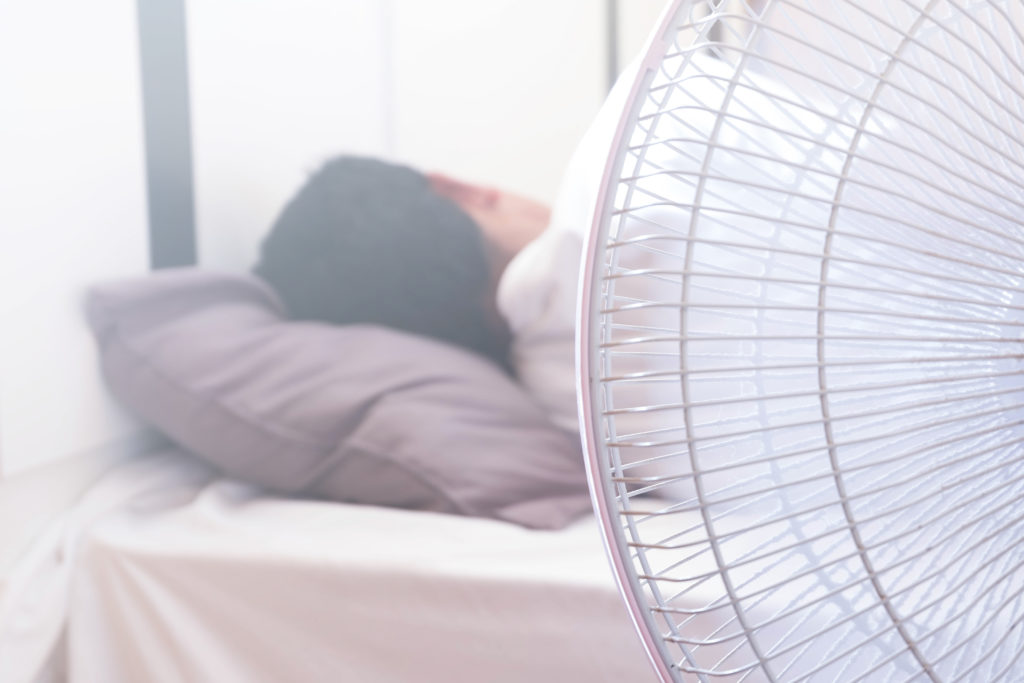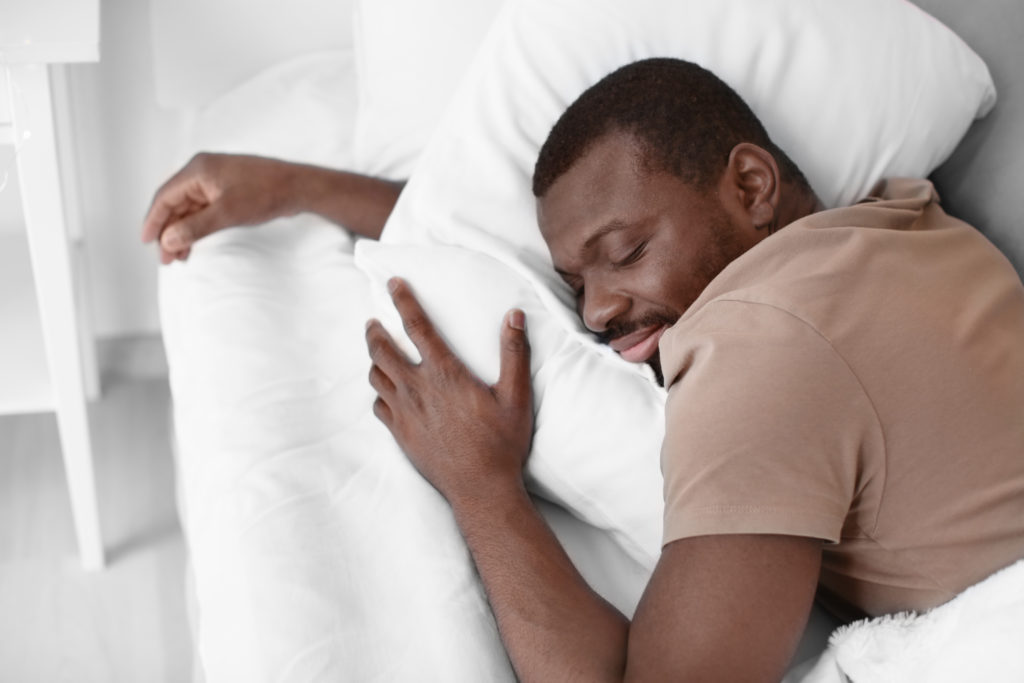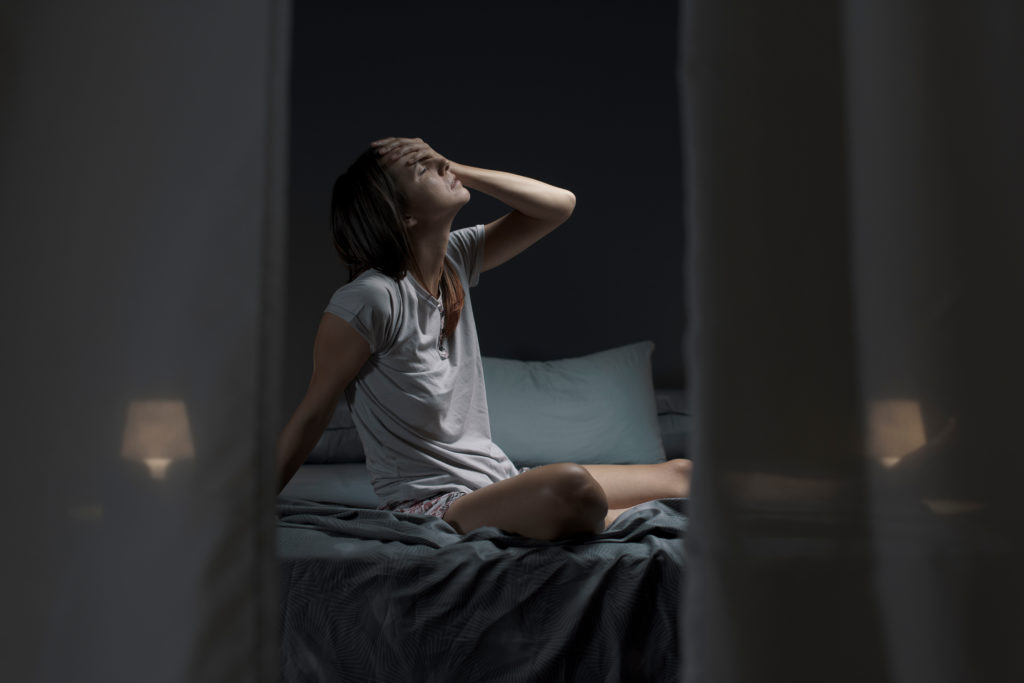August 22, 2022
Why Do I Get So Hot When I Sleep?
8 tips to help you snooze comfortably.
You’re sleeping peacefully. Suddenly in the quiet hours, you wake feeling like your back is on fire. You’re covered in a sheen of sweat, lying on damp sheets. It would be understandable if you were in the middle of the Sahara. But this is your bedroom.
Welcome to the nocturnal reality of a growing number of adults. Are you one of the one of the millions wondering, “Why do I get so hot when I sleep?” There are lots of reasons people wake up hot. Before you call your primary care physician to see if there is something wrong, here are eight reasons, and eight things you can do to sleep better.
Turn down the temp.
Warm and cozy may sound inviting when you’re ready to nod off. Still, if you get so hot at night you can’t sleep, you really need to chill. Lots of sleep medicine research shows the ideal temperature for sleep is a cool 66°F to 70°F.
In fact, heat really is the enemy of sleep. It actually makes you feel more awake. If you do manage to doze off, heat decreases slow-wave and rapid eye-movement sleep that puts your body in its most restful state. Not sure if you’re getting enough slow-wave sleep at night? An overnight stay in a private sleep lab can provide answers to the proverbial “Why do I get so hot when I sleep?”
Try this tip: Set your thermostat to 66°F to 70°F a few hours before bed so your room will be cool and comfortable when you’re ready to sleep.
Shed the stress before you slumber.
Morning traffic was a beast. You lost your phone. A few zeroes seem to be missing from your bank account. Stress has a way of getting under our skin—literally.
When you feel stressed, your blood vessels constrict. When this happens, your skin temperature drops, but your core body temperature shoots up—which could be a big reason you get so hot at night. So, along with feeling anxious and irritable, stress can rob you of a good night’s sleep. Before your head hits the pillow, make time to relax and unwind.
Try this tip: Do some slow, deep-breathing exercises before settling into a warm bath. Cap it off with a soothing cup of fragrant, decaf tea.
Choose your bedfellows carefully.
If your bedtime involves cuddling with your partner, kids or furry friends, you could be sabotaging your sleep. Bodies constantly give off heat. If there are people and pets snuggled next to you, their combined body heat will raise the overall temp of your bed and bedroom. The more bodies snuggled into a small the space, the faster the area will heat up. No wonder you get so hot at night!
Try this tip: Have cuddle time before lights out, then tuck kids and pets into their own beds for sleep.
 Give your bed a cool makeover.
Give your bed a cool makeover.
Burrowing under a fluffy duvet or layers of soft blankets at the end of the day may seem like a little bit of heaven. Still the end-of-day ritual could be a big reason why you get so hot at night. It all comes down to having the right kind of bedding for good sleep.
Think of your bedding as insulation. The thicker it is, the more heat it traps. Plus, different fabrics (wool, cotton and polyester) have different heat-retaining properties. Select your sheets, blankets and even your sleepwear with good sleep in mind. Sleep studies show wool helps people fall asleep faster, but cotton promotes deeper sleep. Polyester ranked the same as wool. Bottom line: Choose bedding and PJs that can help keep you from waking up and wondering, “Why do I get so hot when I sleep?”
Try this tip: If you get the night sweats, swap your wool or poly-blend blankets for cool cotton.
Cut the caffeine for more Zzzzs.
A caffeine-laced drink is one of the first things many of us reach for every morning. Our drink of choice might be a steaming cup of dark roast, a frothy latte or cold energy drink. Millions of us count on caffeine to power through work deadlines, keep up with our kids, and have enough go-power to make it through our busy days.
There’s a trade-off for indulging our caffeine cravings. Along with boosting our mental alertness, caffeine also boosts our core body temperature. If you’re buzzed before bedtime, you can count on having trouble falling and staying asleep.
Try this tip: Cut your caffeine intake at least six hours before you plan on going to sleep so you don’t get so hot at night.
Hone in on hormonal changes.
Women in the throes of menopause know all about hot flashes and night sweats. They often get so hot at night that their sheets and bed clothes become so soaked with sweat. Women in their 30s and 40s can suffer through night sweats due to hormonal changes before and during their periods. Pregnant women can experience them, too.
 Men aren’t immune. Along with fatigue and trouble sleeping, they can experience depression, lower muscles mass and erectile dysfunction when their hormone levels get out of whack.
Men aren’t immune. Along with fatigue and trouble sleeping, they can experience depression, lower muscles mass and erectile dysfunction when their hormone levels get out of whack.
Changes or imbalances in estrogen and progesterone levels for women, and testosterone in men, can raise the body’s core temperature, leaving individuals feeling miserable because they get so hot at night.
Try this tip: Women, talk to your gynecologist about women’s health issues that can affect hormonal balance. Men, talk with your family doctor. There are good hormone replacement therapies that can help.
Go over the list of your meds.
One of the reasons you may get so hot at night could be a medicine you take regularly. There is a long list of medications that can raise your body’s core temperature or make it hard for your body to regulate its temperature. Everything from prescription drugs to over-the-counter (OTC) pain relievers could be a culprit.
Antibiotics, medicines to manage diabetes, diuretics, even drugs like Tylenol made with acetametaphine are just a few. There are many others. Of course, you should never stop taking any prescription medication without first talking with your doctor.
Try this tip: Make a list of all the medications you take, including both prescription and OTC drugs. Share the list with your pharmacist or family doctor to see if any could be the reason you get so hot at night.
Whether you bring it up during your annual wellness check, or make a doctor’s appointment just to talk about your sleep woes, ask if there could be a medical reason you get so hot at night. Many illnesses can boost your body temperature and cause night sweats.
Both can be a symptom of an illness, such as:
- Cold

- Flu
- Strep throat
- Pneumonia
- Bacterial infection
If you routinely get so hot at night you can’t sleep, it could be an early warning sign of a more serious condition, including:
- Cancer
- Coronary heart disease
- Hyperthyroidism
Try this tip: Stay on top of all your regular wellness checks. It’s the best way to ensure health issues are found early when they can be treated more easily.
DISCLAIMER
The information featured in this site is general in nature. The site provides health information designed to complement your personal health management. It does not provide medical advice or health services and is not meant to replace professional advice or imply coverage of specific clinical services or products. The inclusion of links to other web sites does not imply any endorsement of the material on such websites.